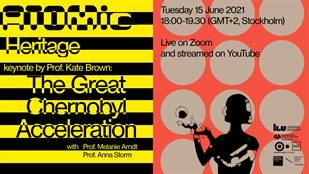zoom platform
We invite you to a meeting with the researchers of the dream laboratory Dr Stanley Krippner, and Michael Bova. They will share their memories of the "Living Environment" (1971-1972) established by Aleksandra Kasuba at her apartment in Manhattan.
Find out more >
Zoom platfom, Youtube channel
"The Great Chernobyl Acceleration" by Prof. Kate Brown
(MIT)
Live on Zoom and streamed on YouTube, public and open to everyone
(with pre-registration)
Find out more >

U.N. websites say that 33 people died from the 1986 Chernobyl catastrophe and 6,000 children got cancer. Is that the extent of the damage? Working through newly disclosed Soviet health archives, historian Kate Brown discovered that Soviet doctors reported a public health disaster in the Chernobyl-contaminated territories in the late 1980s. The archives show a death toll of not 35, but 35,000 and tens of thousands hospitalized after the disaster. What happened to this story? In this keynote address, delivered as part of the conference Atomic Heritage, Prof. Brown explores international archives to show how evidence of widespread health problems from Chernobyl exposures disappeared from the scientific consensus.
Prof. Kate Brown is Professor of Science, Technology and Society
at the Massachusetts Institute of Technology, USA. She is the
author of Plutopia: Nuclear Families in Atomic Cities and the Great
Soviet and American Plutonium Disasters (Oxford 2013) and Manual
for Survival: A Chernobyl Guide for the Future (Penguin 2019). The
discussion of "The Great Chernobyl Acceleration" will address the
production of knowledge, non-knowledge and material culture in the
societies and natures that are being transformed by nuclear
technology. Originally the talk was scheduled to take place in
September 2020, alongside the exhibition "Splitting the Atom,"
curated by Ele Carpenter and Virginija Januskeviciute at the
Vilnius Contemporary Art Centre, but the event was postponed
because of the Covid-19 pandemic. "Splitting the Atom" was
successfully opened and its legacy could be explored online (https://daleliuskilimas.cc/en/ ). In 2021 the
organisers would like to invite the audiences interested in the
link between art and technology to follow "The Great Chernobyl
Acceleration" through the Lithuanian National Art Gallery's live
stream.
With the participation of Prof. Melanie Arndt, University of
Freiburg, Germany, and Prof. Anna Storm, Linköping University,
Sweden.
Programme: https://ticcih.org/wp-content/uploads/2021/06/final-programme.pdf
Live streaming on YouTube: https://youtu.be/57KNWaLityo
Preregistration: https://liu-se.zoom.us/webinar/register/WN_y_IVJr75SMyqsbrvlSfjdA
Organised by the research project "Atomic
Heritage Goes Critical," Linköping University (Sweden), in
partnership with Kingston University London (UK) and Pompeu Fabra
University (Spain).
Co-hosted by: National Gallery of Art (Vilnius)
and This Is Tomorrow.


